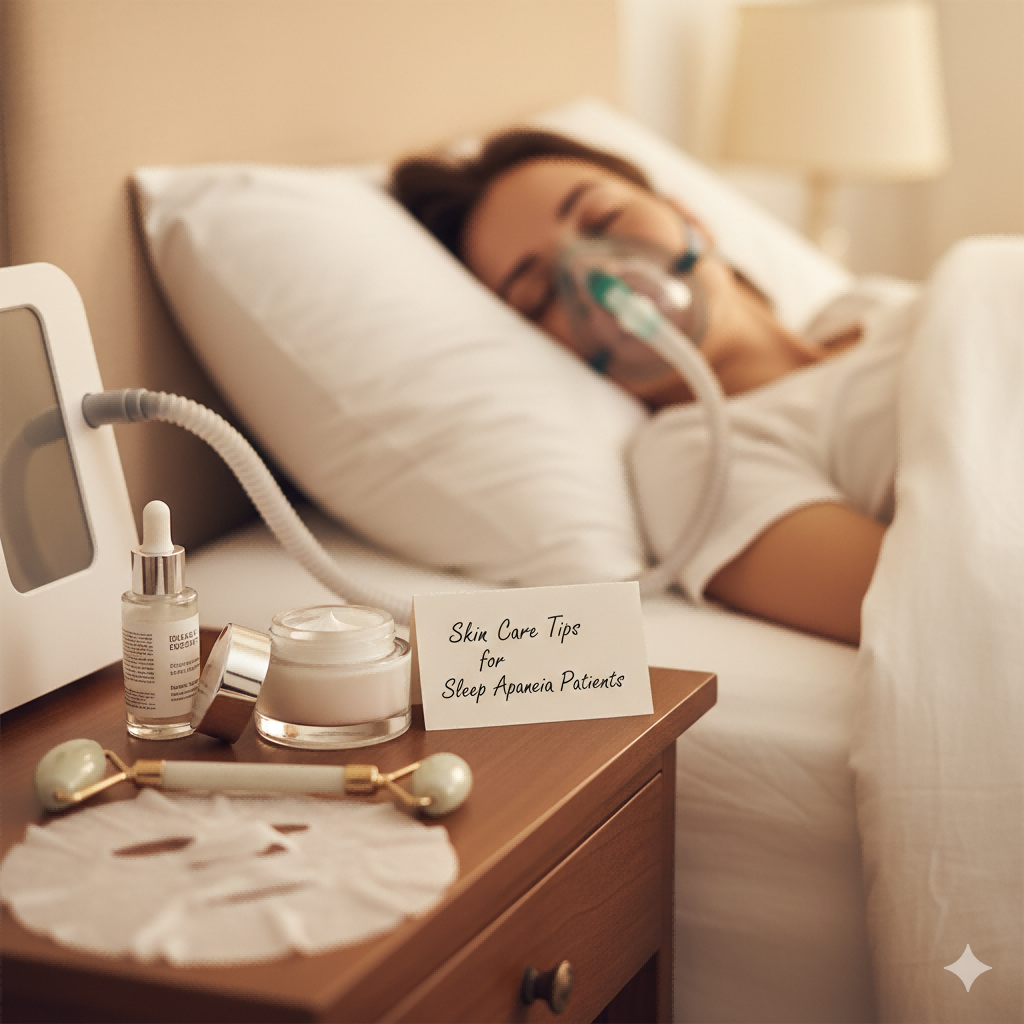Skincare Advice for Individuals with Sleep Apnea: Effective Ways to Protect Your Skin


Introduction to Sleep Apnea and Skin Health
Sleep apnea is a chronic sleep disorder where breathing repeatedly stops and starts during the night. Many patients rely on Continuous Positive Airway Pressure (CPAP) machines to improve sleep quality and overall health. While CPAP therapy is life-changing, it can sometimes lead to unexpected challenges for the skin.
Dryness, irritation, and even breakouts can affect confidence and comfort. That’s why learning effective skin care tips for sleep apnea patients is crucial—not only to improve skin appearance but also to ensure consistent CPAP use without discomfort.
How Sleep Apnea Affects Skin Health
The Role of Poor Sleep on Skin Appearance
When sleep apnea disrupts rest, the skin doesn’t get the chance to repair and rejuvenate. This can cause:
- Dark circles under the eyes
- Dull and tired-looking skin
- Increased sensitivity
Impact of CPAP Masks on Skin
The CPAP mask is a common culprit in skin issues. Prolonged pressure and friction can trigger:
- Redness and pressure marks
- Acne-like breakouts
- Skin barrier damage
Common Skin Concerns in Sleep Apnea Patients
Dryness and Irritation
Airflow from CPAP machines may reduce skin hydration, causing flaky, tight, or itchy skin.
Pressure Marks and Redness
Straps and tight-fitting masks can leave indentations or redness that lingers even after waking.
Acne Breakouts from Mask Use
Bacteria buildup inside masks can clog pores, resulting in acne flare-ups.
Premature Aging Signs
Interrupted sleep accelerates aging, leading to wrinkles and sagging skin over time.
Best Skin Care Tips for Sleep Apnea Patients
Cleansing Before and After CPAP Use
Always wash your face before putting on your CPAP mask. Use a gentle cleanser that removes dirt and oil without stripping moisture.
Choosing the Right Moisturizer
Opt for non-comedogenic, fragrance-free moisturizers to maintain hydration while avoiding clogged pores.
Using Barrier Creams for Protection
A thin layer of barrier cream or gel can help reduce friction and protect sensitive areas like the nose and cheeks.
Nighttime Skin Care Routine
Incorporate serums with hyaluronic acid and antioxidants to help repair skin overnight.
CPAP Mask Hygiene and Skin Care
Cleaning Masks and Straps Properly
Wash your CPAP mask daily with mild soap and warm water. Dirty masks harbor bacteria that can irritate skin.
Replacing Old or Worn-Out Masks
Over time, masks lose their proper fit and may cause more irritation. Replacing them every 3–6 months is recommended.
Natural Remedies and Lifestyle Habits
Hydration and Diet for Healthy Skin
Drink enough water and eat foods rich in omega-3 fatty acids, like salmon and walnuts, to support skin repair.
Gentle Home Remedies for Irritation
- Aloe vera gel to soothe redness
- Coconut oil for mild dryness (use sparingly)
- Chamomile compresses for inflammation
Dermatologist-Recommended Treatments
When to Seek Professional Help
If irritation persists despite home care, consult a dermatologist for tailored treatments.
Medical-Grade Skin Care Options
Prescription creams or laser treatments may help reduce scarring, redness, or stubborn breakouts caused by CPAP use.
Preventive Measures for Long-Term Skin Health
Mask Fitting and Adjustments
Work with your sleep specialist to ensure your mask fits correctly without excessive pressure.
Using CPAP-Friendly Skincare Products
Avoid oily or heavy products before bedtime, as they can affect mask sealing and worsen skin irritation.
FAQs About Skin Care and Sleep Apnea
Q1. Can CPAP masks cause acne?
Yes, bacteria buildup and friction from masks can trigger acne. Proper cleaning and non-comedogenic skincare can help.
Q2. What’s the best moisturizer for CPAP users?
Choose lightweight, fragrance-free moisturizers with hyaluronic acid or ceramides.
Q3. How can I prevent CPAP strap marks?
Use mask liners, adjust straps, and apply barrier creams to reduce friction.
Q4. Should I wash my face every time before using CPAP?
Yes, cleansing before use reduces oil and bacteria, preventing irritation.
Q5. Can sleep apnea worsen wrinkles?
Interrupted sleep may accelerate skin aging, making wrinkles more visible.
Q6. How often should I replace my CPAP mask?
Every 3–6 months, depending on wear and tear.
Conclusion: Healthy Sleep and Healthy Skin
Balancing CPAP therapy with proper skin care is essential for comfort and confidence. By adopting the right skincare routine, maintaining mask hygiene, and seeking professional help when needed, sleep apnea patients can enjoy both restful sleep and radiant skin.
👉 Learn more about CPAP skin care from the American Academy of Sleep Medicine here.
















